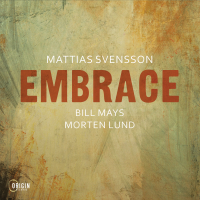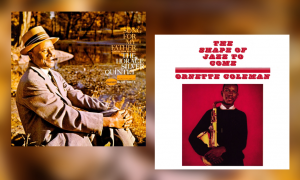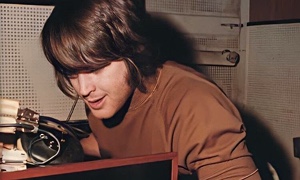Home » Jazz Articles » Building a Jazz Library » Bill Evans
Bill Evans
Evans started playing piano at age six. Studies on violin, flute and piccolo may have helped shape the strong lyricism for which he is known. He began forming and playing with jazz bands while still in high school.
He graduated from Southeastern Louisiana College in 1950, served in the Army from 1951 to 1954, and shortly afterward began playing with local dance bands and as a sideman with small jazz groups. Performances with players such clarinetist Tony Scott and guitarist Mundell Lowe brought him to the attention of the emerging independent Riverside Records.
His debut trio album New Jazz Conceptions sold only 800 copies its first year. He continued working his way up in stature, with Davis recruiting him in 1958. But stress from the stage life and discrimination from Davis' fans took a heavy toll on Evans. Surrounded by addicted players, he developed a full-blown heroin habit that eventually led to his death.
Evans formed his most acclaimed trio in 1959 with bassist Scott LaFaro and drummer Paul Motian. His career peaked with a performance at the Village Vanguard on June 25, 1961, that resulted in two landmark albums, Sunday At The Village Vanguard and Waltz For Debby. But a crushing blow followed almost immediately, as LaFaro was killed in a car accident a few weeks later. Evans retreated into seclusion for months, and when he reemerged his life and playing became more erratic.
He made numerous recordings during the next few years, working beyond the trio format with such performers as Charles Mingus, Tony Bennett, Stan Getz, Toots Thielemans and Jim Hall. A resurgence during the early 1970s was sparked after bassist Eddie Gomez joined the trio in 1966. Gomez' inventive fast-paced playing was more forceful than previous sidemen, and this presence and influence on Evans' playing grew throughout their 11-year association.
Evans formed his final trio in 1978 with bassist Marc Johnson and drummer Joe La Barbera, capturing much of the spirit of the pianist's original trio. His final triumph is captured on The Last Waltz, an eight-disc set from nine days of concerts at the Village Vanguard a week before his death. Evans knew the end was near and performed what many considered his most moving work in years. He died on Sept. 15, 1980.
 New Jazz Conceptions
New Jazz Conceptions (Riverside, 1956)
Evans' debut is a largely mainstream bop effort in the Powell tradition without much of a distinctive voice. His first recording of "Waltz For Debby" and his treatments of "Displacement," where few notes fall on the beat, and "Five," featuring a frenetic quintuplet-based beat in 4/4 time, hint at future developments.
 Everybody Digs Bill Evans
Everybody Digs Bill Evans (Riverside, 1958)
A clear step toward the more relaxed and meditative style for which Evans is famous, featuring the moving ballad "Young and Foolish" and the famous melodic improvisational experiment "Peace Piece."
 Portrait In Jazz
Portrait In Jazz (Riverside, 1959)
Evans' peak period begins with the first album to feature his famed trio with LaFaro and Motian Their fast-paced interplay on "Someday My Prince Will Come" and interpretations on two versions of "Blue In Green" sparkle among many highlights.
 Explorations
Explorations (Riverside, 1961)
In the elite category, but with some tension between players during the session. LaFaro had to play a replacement bass since his regular one was being repaired, so his playing is a bit restrained.
 Sunday At The Village Vanguard
Sunday At The Village Vanguard(Riverside, 1961)
Waltz For Debby (Riverside, 1961)
The pianist's definitive albums are masterpieces of phrasing in melody and solos, and a revelation of how members of a trio can interact with and shape a song. LaFaro in particular captivates with his basslines on the Sunday album, making his death ten days later all the more tragic.
 Conversations With Myself
Conversations With Myself(Verve, 1963)
Evans predictably got widely varying reviews for this album where he triple-tracks himself on piano, but won his first Grammy for the results. Similar to his double-tracked Further Conversations With Myself (1967), which some say is more disciplined and harmonically focused.
 At The Montreux Jazz Festival
At The Montreux Jazz Festival(Verve, 1968)
Evans won his second Grammy for this trio album, as Gomez and drumming legend Jack DeJohnette play with an energy that lures Evans into playing freer than usual.
 Alone
Alone (Verve, 1969)
Evans' first solo album won a Grammy, but also received heavy criticism from some who called it a rambling effort needing the discipline of sidemen.
 Intuition
Intuition (Fantasy, 1974)
Those wanting to hear Evans on electric keyboard might find this their best bet—or at least a safe one—as he alternates between electric and acoustic on this duo collaboration with Gomez. The interaction is superb and most of the songs are new compositions.
 The Tony Bennett / Bill Evans album
The Tony Bennett / Bill Evans album(Fantasy, 1975)
An unlikely but successful collaboration, with Evans largely playing a supportive role as Bennett delivers emotionally sincere efforts on songs like "The Days Of Wine And Roses," "Young And Foolish" and "Waltz For Debby."
 You Must Believe In Spring
You Must Believe In Spring (Warner Bros., 1977)
Evans' debut for Warner Brothers does a better job than many 1970s albums of capturing his brooding and melodic strengths, with a surprisingly diverse feeling for an album of ballads.
 Marian McPartland's Piano Jazz
Marian McPartland's Piano Jazz(Concord Records 1978)
One of the best in McPartland's long-running radio series. Features a number of solo and duet pieces plus Evans discussing and demonstrating his technique in-depth.
 The Complete Riverside Recordings
The Complete Riverside Recordings (Riverside, 1991)
This 12-disc boxed set covers Evans' development and peak career period from 1956 to 1963, including his landmark Village Vanguard dates.
Tags
Bill Evans
Building a Jazz Library
Mark Sabbatini
United States
Bud Powell
Keith Jarrett
Chick Corea
Tony Scott
Mundell Lowe
Scott LaFaro
Paul Motian
Charles Mingus
Tony Bennett
Stan Getz
Toots Thielemans
Jim Hall
eddie gomez
Marc Johnson
Joe Labarbera
PREVIOUS / NEXT
Support All About Jazz
 All About Jazz has been a pillar of jazz since 1995, championing it as an art form and, more importantly, supporting the musicians who make it. Our enduring commitment has made "AAJ" one of the most culturally important websites of its kind, read by hundreds of thousands of fans, musicians and industry figures every month.
All About Jazz has been a pillar of jazz since 1995, championing it as an art form and, more importantly, supporting the musicians who make it. Our enduring commitment has made "AAJ" one of the most culturally important websites of its kind, read by hundreds of thousands of fans, musicians and industry figures every month.

























